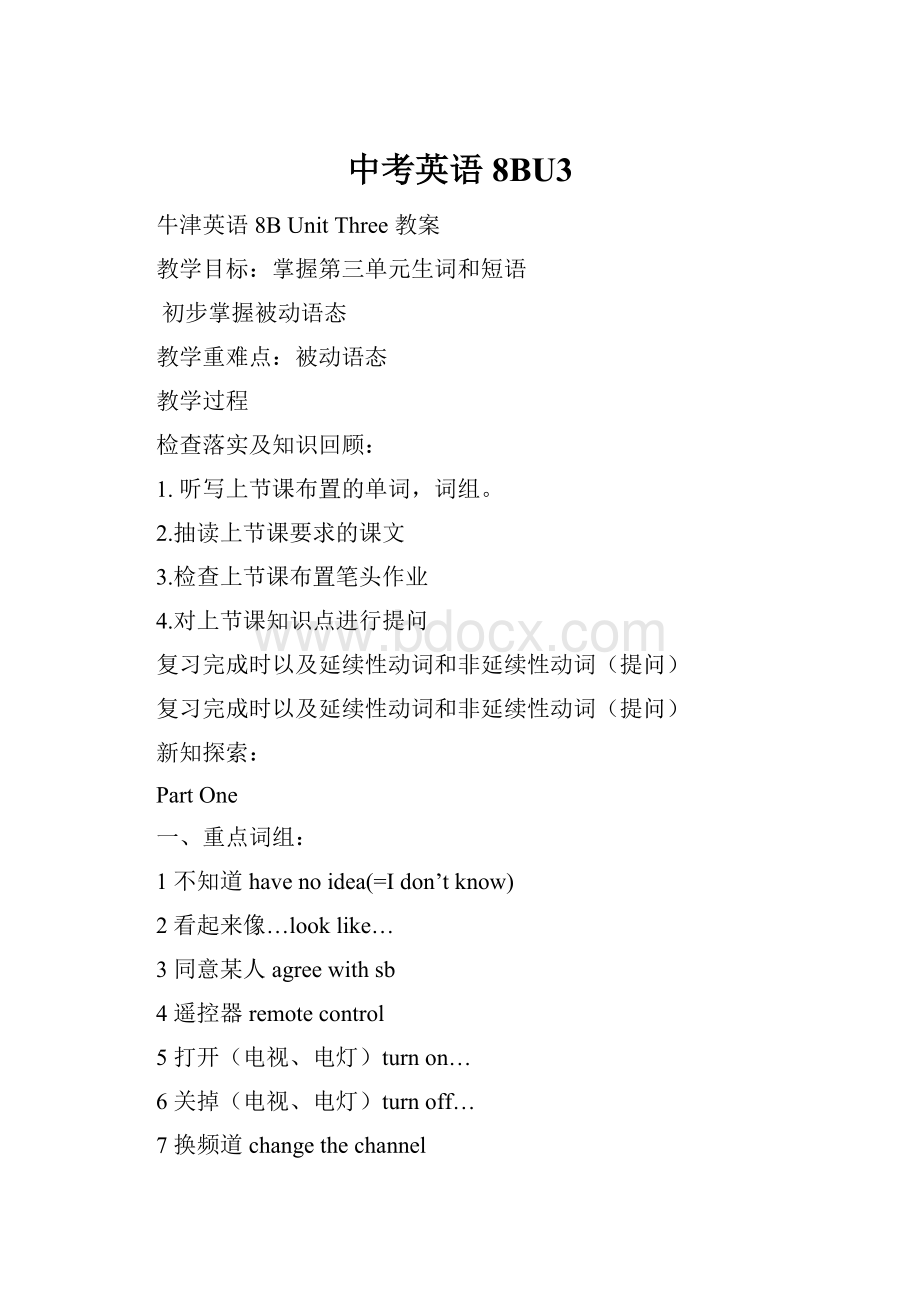中考英语8BU3.docx
《中考英语8BU3.docx》由会员分享,可在线阅读,更多相关《中考英语8BU3.docx(19页珍藏版)》请在冰豆网上搜索。

中考英语8BU3
牛津英语8BUnitThree教案
教学目标:
掌握第三单元生词和短语
初步掌握被动语态
教学重难点:
被动语态
教学过程
检查落实及知识回顾:
1.听写上节课布置的单词,词组。
2.抽读上节课要求的课文
3.检查上节课布置笔头作业
4.对上节课知识点进行提问
复习完成时以及延续性动词和非延续性动词(提问)
复习完成时以及延续性动词和非延续性动词(提问)
新知探索:
PartOne
一、重点词组:
1不知道havenoidea(=Idon’tknow)
2看起来像…looklike…
3同意某人agreewithsb
4遥控器remotecontrol
5打开(电视、电灯)turnon…
6关掉(电视、电灯)turnoff…
7换频道changethechannel
8写作竞赛writingcompetition
9绘画与设计drawinganddesigning
10玩游戏playgames
11搜索信息searchforinformation
12收发电子邮件sendandreceivee-mails
13文字处理wordprocessing
14编写电脑程序writecomputerprograms
15新的教育光盘aneweducationalCD-ROM
16‘八小时环游地球’‘Aroundtheworldineighthours’
17发行,问世comeout
18同时atthesametime
19学生最喜爱的光盘的设计者thedesignerofchildren’sfavouriteCD-ROM
20‘在线旅行者’‘OnlineTraveller’
21主要人物maincharacter
22一个十三岁的男孩athirteen-year-oldboy
23躺在草地上lieonthegrass
24看着美丽的蓝天lookatthebeautifulbluesky
25睡着了fallasleep
26做了个奇怪的梦haveastrangedream
27在梦里inthedream
28一片金色的云agoldencloud
29得一分getapoint
30载着某人去一个地方carrysbofftoaplace
31扮演…角色playtheroleof…
32环游世界travelaroundtheworld
33测试你的英语语法知识testyourknowledgeofEnglishgrammar
34在屏幕上onthescreen
PartTwo
1.Ihavenoidea.
Ihavenoidea=Idon’tknow.
2.Itlookslikeatelevision.
Lookup
Lookoutof
Lookout
Lookover
3.Ithinkit’stheremotecontrol.
(1)remote作形容词,意为“遥控的;(指时间或地点)遥远的;偏僻的”等。
electricremote电力遥控
radioremote无线电遥控
remotestar遥远的星星
remotevillage穷乡僻壤
remotefuture遥远的未来
(2)controln.遥控装置,控制;支配;管辖
AllschoolsareunderthecontroloftheMinistryofEducation.
controlv.控制;调节;克制
Atpresentit’snecessarytocontroltherisingprice.
4.Let’schangethechannel.
ThereisachannelbetweenTaiwanandthemainland.
5.TheComputerClubisholdingawritingcompetition.
marketcompetition
pricecompetition
sportscompetition
askatingcompetition
6.DanielwantstowriteabouthisfavoriteeducationalCD-ROM.
*educationaladj._____________n.education
7.Iusuallyuseittosearchforinformation.
(1)usesth.todosth.意为用某物做某事,todosth.在句中作目的状语
(2)①句中search=trytofindbylooking,意为“搜寻;搜查;搜索”,search的宾语一般是被搜查的人或某一场所,而不是要寻找的东西。
searchaperson
searchone’smemory
searchone’sheart
Isearchedeverywhereforthebook..=Isearchedforthebookeverywhere.
②Search常与for连用,searchfor相当于lookfor;但searchfor表示用极大的注意力去寻找人或物,而lookfor指一般的寻找。
Searchfor指一般的寻找。
Searchfor和lookfor均指具体的动作,find则表示结果。
③inone’s/a/thesearchfor和insearchof均为“寻找,寻求”之意。
Sofar,theyhavebeenunluckyintheirsearchforgoldandhavenomoneyatall.
迄今为止,他们在淘金过程中并不走运,而且身无分文。
Somebirdsflytothesouthinsearchofwintersun.
8.HeisreadinganarticleaboutaneweducationalCD-ROMcalled“AroundtheWorldinEightHour”.
Call做动词,意为“叫喊;打电话;拜访;邀请”。
Anoldfriendcalledonmethedaybeforeyesterday.=Anoldfriendvisitedmethedaybeforeyestayday.
9.ItisdesignedbyNancyJackson.
(1)designv.
Theclevergirldesignedadressforthefashionshow.
(2)designn.(c.n)
Theytalkmuchaboutherdesigns.
10.ThemaincharacterofthiswonderfulnewgameisItchyFeet.
(1)Ifindallthecharactersinhisnewplayveryreal.角色
(2)charactern.性质,特征,性格,字
Thesetwothingsaredifferentincharacter.
WhatdoyouthinkofJapanesenationalcharacters?
ManyChinesecharacterslooklikesmallpictures.
11.Inhisdream,hesawagoldencloud.
Gold/golden
12.Whenyouhavegotenoughpoints,acloudwillcomedownandcarryyouofftoaplaceyouhavenevervisitedbefore.
Carry,take,bring均有“拿”的意思,但用法有别。
Carry意为“携带;搬运”,强调吧物品从甲地移至乙地,带有物品随身移动但五固定方向。
此外,空气、水和电携带物品也用carry表达。
Theboatwascarriedbythewavestoasmallisland.
bring带来;take带走。
13.Whenyouplaythisgame,youwillplaytheroleofItchyFeet.
rolen.角色;作用,任务
Playtheroleofsb.扮演……角色
Scienceplaysanimportantroleinthedevelopingproduction.
14.ThisCD-ROMhelpsyouEnglishbytestingyourknowledgeofEnglishgrammarandvocabulary.
(1)testv.
Theteachertestedthechildrenontheirhomework.
(2)testn.
haveatest
giveatestinEnglish
atestofone’seyesight
15.Theplacesyouhavevisitedaremarkedinbrightpurple.
(1)markv.
Shemarkedtheimportantwordswitharedpencil.
(2)markn.标志;分数;记号
Itisdangeroustoswimbeyondthismark.
Hegot90marksformaths.
16.Oh,Igetitnow.
Get作为动词有很多意思。
句中的get意为“了解;明白”,常用于英语的日常口语中。
*Doyougetme?
=Doyouunderstandme?
*Idon’tgetit,whydidyoudothat?
17.Mynewcomputerismuchfasterthantheoldone.
两者相比,用“A+be+形容词比较级+than+B”,意思为“A比B更……”
Thisarticleismuchmoredifficultthanthatone.
18.Howdoyouknowwhatyoushoulddowhenyoulookatthescreen?
Howcanyourteacherreadyourhomeworkonthecomputer?
Should
(1)情态动词should表示劝告、建议、命令,其同义词是oughtto.在疑问句中,常用should代替oughtto。
shoulddosth./oughttodosth.
Youshouldbemorepatient.
*Yououghttobemorepatient.
(2)表示推测、推论或可能性,意为“可能,该”。
Heshouldbearoundsixtyyearsold.
(3)用于疑问句中,表示惊讶、难以相信或不应该的事。
Shouldshedosuchathing?
她会做这种事吗?
Whyshouldhetellalie?
(4)表示谦逊、婉转的口气,用于提出建议、意见或请求,意为“倒想,想”等。
Ishouldsayitwouldbebettertodelaythemeeting.我看最好还是推迟这次会议。
Can
(1)表示能力
HermothercanspeakFrench.
(2)表示客观可能性
Anyonecanmakemistakes.
(3)表示许可(多用于口语)。
CanIgonow?
(4)表示请求。
在这种语境下,使用could比用can语气更显委婉客气。
Could此时和can没有时间上的差别,它主要用于疑问句,不用于肯定句,因此回答时要改为can。
--CouldIcomehereagaintomorrow?
--Yes,youcan.(No,I’mafraidnot.)
(5)表示惊异、怀疑、不相信的态度(主要用于否定句、疑问句或感叹句中)。
Thiscan’tbedonebyhim.
Pscan和beableto的区别(时态)将来时
19….itisobviouswhoperformedtheaction.
(1)obviousadj.
Itisobviousthatwecansavemuchenergyinthisway.
(2)句中performv.意为“做;履行;执行;表演”等。
Thesurgeonperformedtheoperationsuccessfully.
performancen.表演,表现
Howabouthisperformancetoday?
20.Wordprocessingskillsaretaughtinourcomputerlessons.
processv.加工;处理
Howlongdidittakeyoutofinishprocessingtheusefulinformation?
21.ThefactthateducationalCD-ROMsaresoldinmanycountriesismoreimportantthanknowingwhoisresponsibleforsellingtheCD-ROMs.
事实上,知道教育光盘在许多国家有售比知道谁负责出售光盘更重要。
beresponsiblefor对…负责
Thebusdriverisresponsibleforthepassengers’safety
22.Completetheconversationusingthepassivevoiceinsimplepresenttense.
Completev.意为“完成;结束”,侧重于补足所缺部分;achieve侧重指成功地完成,含有经过努力而获得或达到;finish通常指最后的加工或润色。
Completeyourapplicationinink.(申请表)
I’veachievedonlyhalfofwhatI’dhopedtodo.
ThisblouseneedstobefinishedoffbeforeIcanwearit.(再加工)
.Ican’topenmye-dictionaryonmynewcomputer.
e-=electronic电子的
e-mail
e-book
e-magazine
e-school
e-business
e-newspaper
22.Didyouconnectthekeyboardtothecomputerproperly?
Connectv.
Connectto把…连接到…
Connectwith和……有关,和……有联系
Heisconnectedwiththemurder.
23.Didyoudouble-clickthe“auto-run”iconafteryouputintheCD-ROM?
放入光盘后你有没有双击“自动运行”图标?
(1)doubleadj.adv.
Whenonedrinkstoomuch,hesometimesseesdouble.
(2)doublev.
Tradebetweenthetwocountrieshasalmostdoubledinthelastfiveyears.
(3)doublen.
Hetookdoubleofwhattheotherchildrendid.
24.Topicsincludetravelandhotel,foodanddrink,shoppingandmoney.
includev.
DoestheUnitedKingdomincludeNorthernIreland?
p.s.
Zhalongisthehomeofalotofplantsandanimals,includingdifferentkindsofbirds.
Zhalongisthehomeofalotofplantsandanimals,differentkindsofbirdsincluded.
25.Doyoumindtellingmehowtousethisfunction?
(1)mindv.反对,介意
DoyoumindifIsmokehere?
mindone’s/sbdoing“介意某人做某事”
---Wouldyoumindmy/mesittinghere?
---Notatall./Sorry,pleasedon`t.
用于询问对方是否同意自己去做某事;一般情况下对方都用否定回答“No,never或Notatall”表示同意。
不同意时也要委婉地拒接。
(2)mindn.想法;意见;主张;心;记忆力
Shehasamindtotravelabroad.
PartThree
1.被动语态概述
语态是动词的一种形式,用以说明主语与谓语动词之间的关系。
英语的语态共有两种:
主动语态和被动语态。
主动语态表示主语是动作的执行者,被动语态表示主语是动作的承受者。
被动语态是动词的一种特殊形式,一般说来,只有需要动作对象的及物动词才有被动语态。
汉语往往用“被”、“受”、“给”等词来表示被动意义。
e.g.Heopenedthedoor. 他打开了这扇门。
(主动语态)
Thedoorwasopened. 这扇门被打开了。
(被动语态)
2、被动语态的构成
被动语态由“助动词be+及物动词的过去分词”构成。
被动语态的时态变化只改变be的形式,过去分词部分不变。
疑问式和否定式的变化也如此。
1、被动语态的时态较常见的八种,现以动词clean为例列表说明:
现在
过去
将来
一般
进行
完成
2、被动语态的句式变化:
以一般现在时和动词invite为例,列表说明被动语态的句式变化:
肯定句
否定句
Iaminvited.
He/She/Itisinvited.
We/You/Theyareinvited.
Iamnotinvited.
He/She/Itisnotinvited.
We/You/Theyarenotinvited
疑问句
简略回答
肯定回答
否定回答
AmIinvited?
Areyouinvited?
Are
yes,youare
Yes,
Yes,
Yes,
No,youaren't
No,
No,
No,
3、含有情态动词的被动语态
情态动词的被动语态结构为:
情态动词+be+过去分词;
其时态及句型的变化仅由情态动词完成,“be+过去分词”部分不变。
e.g.Tablescanbemadeofstone. 桌子可由石头制造。
Tablescouldbemadeofstoneatthattime. 那时桌子可由石头制造。
(一般过去时)
Cantablesbemadeofstone?
桌子能用石头制造吗?
(疑问句)
3、被动语态的用法:
1、不知道或没有必要指出谁是动作的执行者时。
Thebridgewasbuiltlastyear. 这座桥是去年建造的。
Hewaselectedchairman. 他被选为主席。
2、当更加强调动作的承受者时。
此时动作的执行者由by引导置于谓语动词之后,不需要时可以省略。
Theroomhasn'tbeencleanedyet. 房间还没有打扫。
Thetigerwaskilledbyhim. 老虎被他杀死了。
3、当动作的执行者不是人时,多用被动语态。
Thewindowwasblownbywind. 窗户被风吹开了。
Thewholevillagehasbeenwashedawaybytheflood. 整个村庄都被洪水冲走了。
4.see/hear/watch/make---sbdo---改为被动语态时to要加上
Isawhimfalloffthetree.
Hewasseentofalloffthetree.
4、表示客观的说明常用“Itis+过去分词”句型。
ItissaidthatLucyhasgoneabroad. 据说露茜已经出国了。
Itisbelievedthatheisaspy.(=Heisbelievedtobeaspy.) 大家相信他是个间谍。
其它常见的“Itis+过去分词+that”句型还有:
Itisreportedthat…据报道
Itissaidthat…据说
Itisbelievedthat…大家相信
Itissuggestedthat…有人建议
4、不用被动语态的情况
1、不及物动词或动词短语无被动语态:
常见的不及物动词及动词短语:
appear,die,disappear,end,fail,happen,last,lie,remain,sit,spread,stand,breakout,cometrue,fallasleep,keepsilence,loseheart,take